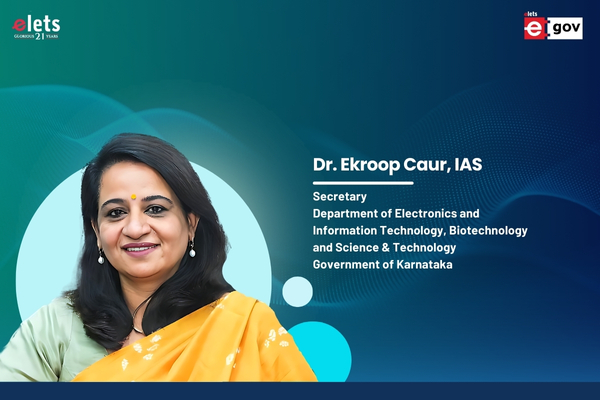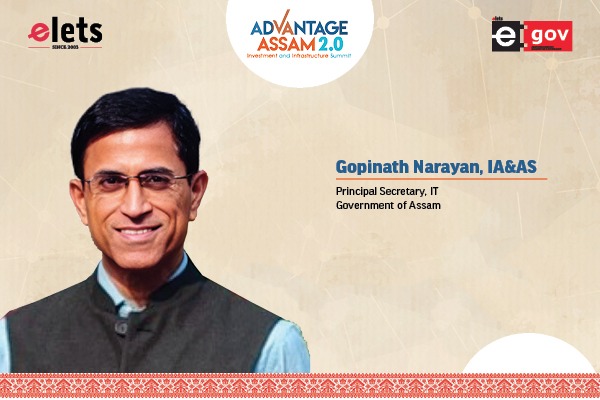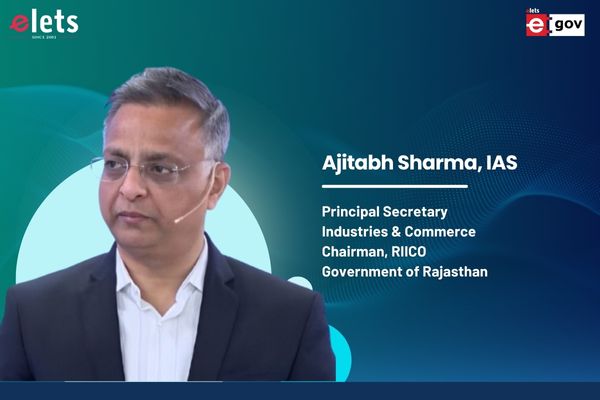
The Karnataka Government aims to create an environment that nurtures innovation, stimulates economic growth, and generates employment in the biotech sector, ensuring the state remains at the forefront of India’s biotech industry and continues to attract investments, shared Dr. Ekroop Caur, IAS, Secretary, Department of Electronics and Information Technology, Biotechnology, and Science & Technology, Government of Karnataka, in an exclusive interaction with Elets News Network (ENN).
Karnataka has topped the NITI Aayog’s India Innovation Index for three consecutive years (2019, 2020, and 2021). Can you provide insights into the specific policies and initiatives that have contributed to Karnataka’s maintaining this leading position, and what new measures are being implemented to ensure continued innovation leadership?

Karnataka has consistently excelled in both NITI Aayog’s India Innovation Index and DPIIT’s State/Union Territory ranking, winning the Best Performer Award in 2021 and 2022. It was the first state to introduce sector-specific innovation policies. The new Startup Policy 2022-2027, developed by the Department of Electronics, IT, BT and S&T, focuses on promoting startups in emerging technology clusters.

Key policies include:

- Karnataka’s IT Policy 2020: Karnataka’s IT Policy 2020 aims to solidify the state’s position as a global IT leader by promoting innovation, supporting startups, and enhancing digital inclusivity. Key initiatives include developing IT infrastructure, addressing skill gaps, and offering financial incentives to attract and retain IT companies, ensuring sustained growth and a robust IT ecosystem.
- Electronics Systems Design & Manufacturing (ESDM) Policy: This policy supports the ESDM ecosystem development in the state by promoting value addition through a combination of incentives, fiscal measures, capital subsidies, and other capacity-building measures.
- Data Centre Policy: Karnataka’s Data Centre Policy aims to position the state as a leading data centre hub by addressing the growing demand for data storage and processing, offering financial incentives, and ensuring robust digital infrastructure. The policy focuses on enhancing data sovereignty, promoting cutting-edge technologies, and providing a streamlined approval process to attract national and international data centre investments.
The Karnataka Unit for International Cooperation and Global Innovation Alliance fosters international partnerships in innovation and technology, engaging with over 30 countries. The Karnataka Digital Economy Mission (KDEM), a government-industry initiative, accelerates growth in the Electronics, IT, BT sectors, and startup ecosystem.

To encourage startups to work with the Government, Karnataka has the Preferential Market Access policy, which provides general relaxations for startups in public procurement, value-based preferential procurement, and the adoption of startup inclusion plans in full tenders.
The State Government of Karnataka has established 17 Centres of Excellence (CoEs) in emerging technology areas, intending to enhance the overall technology ecosystem of Karnataka and create programs and initiatives across four pillars: Industry, R&D/academia, government, and startups/ecosystem building. These CoEs have been established with funding support of over INR 250 crores, providing incubation space of 1.25 lakh sq. feet with state-of-the-art facilities and R&D infrastructure.
Karnataka’s biotech industry comprises approximately 380 companies and 194 startups, accounting for 60% of India’s biotech companies. Additionally, the state employs nearly 54% of the country’s biotech workforce. How does the government plan to sustain this growth and ensure that the state remains a preferred destination for biotech investments?
To sustain the growth of Karnataka’s biotech industry and maintain its status as a preferred destination for biotech investments, the government employs several key strategies:
- Developing Infrastructure: Establishing biotech parks, incubation centres, and research facilities to provide cutting-edge infrastructure, including advanced laboratories, equipment, and technology platforms.
- Policy Support: Offering policy frameworks that support biotech research, development, and commercialisation through tax incentives, subsidies, grants, and regulatory reforms to streamline processes.
- Stimulating Innovation and R&D: Providing grants, funding initiatives, and partnerships with academic institutions and research organisations to foster new discoveries and technologies.
- Strengthening Workforce Skills: Enhancing the biotech workforce through targeted training programs, collaborations with educational institutions, and initiatives to attract and retain talent.
- Facilitating Collaboration: Promoting joint research ventures, technology transfer, and knowledge exchange between biotech firms and academic institutions.
- Supporting Startups: Offering incubation facilities, seed funding, mentorship programs, and networking opportunities to cultivate innovation and entrepreneurship.
- Global Promotion: Actively promoting Karnataka’s biotech capabilities by forming partnerships with international firms and participating in global conferences to attract foreign investments.
- Encouraging Sustainability: Promoting environmentally sustainable practices in biotech manufacturing and processes to align with global standards and certifications.
- Fostering Public-Private Partnerships (PPP): Investing in biotech projects, infrastructure development, and capacity-building initiatives through PPPs to leverage resources and expertise.
- Monitoring and Evaluation: Implementing robust mechanisms to track biotech sector growth through data collection, impact assessments, and feedback loops to refine policies and strategies.
The Karnataka government aims to create an environment that nurtures innovation, stimulates economic growth, and generates employment in the biotech sector, ensuring the state remains at the forefront of India’s biotech industry and continues to attract investments.
One key objective of Karnataka’s IT policy (2020-25) is to boost IT penetration and innovation across the state. What steps are being taken to develop IT ecosystems in regions beyond Bengaluru, and how are local startups and smaller cities supported in this process?
Karnataka’s IT Policy (2020-25) aims to boost IT penetration and innovation across the state, especially in regions beyond Bengaluru. The Karnataka Digital Economy Mission (KDEM) drives key initiatives, including:
- Exclusive Benefits: Startups and IT companies in these areas receive incentives like lease/rent reimbursement, quality certification reimbursement, marketing cost reimbursement, electrical subsidy, PF reimbursement, and stamp duty exemption, potentially reducing costs by upto `40 lakhs for a company with 100 seats.
- Cluster Collaboration through KDEM: The Beyond Bengaluru initiative collaborates with the Department of Electronics, IT, BT, and KDEM to develop IT ecosystems in tech clusters like Mysuru, Mangaluru, Hubballi, Shivamogga, Kalaburagi, and Tumakuru.
- Events and Roadshows: The Big Tech Show, Techceleration, and Technovanza gather stakeholders, leading to nearly 100 Letters of Intent to invest and over 500 meetings with founders.
- Beyond Bengaluru Cluster Fund: A `75 crore fund supports startup growth in the main clusters.
- Karnataka Acceleration Network: Aims to support 360 startups from Beyond Bengaluru over three years, focusing on growth-phase startups.
- IT Infrastructure Support: Up to 20% support for fixed infrastructure investments and up to 33% for co-working spaces to create IT hubs and clusters.
With AI poised to transform industries, how can Bengaluru position itself as a global hub for AI-driven innovation, creating new economic opportunities and attracting future investments?
Karnataka, known as the Silicon Valley of India, is a leader in the IT/ITeS sector, hosting 5,500 companies and 750 MNCs, employing over 2 million people. Bengaluru is a hub for tech giants like Wipro, Infosys, Flipkart, Amazon, and Myntra.
The state’s rich tech ecosystem fosters AI advancements, attracting global talent and companies. With automation, AI, and the gig economy reshaping the work landscape, traditional career paths are evolving towards more flexible environments.
The AI and Robotics Centre of Excellence at IISc, supported by the Karnataka government, drives AI innovations to revolutionise industries and improve quality of life. The ARTPARK initiative addresses public health and climate challenges with computational epidemiology, benefitting over 80 million people through predictive analytics. This model is expanding to other diseases and regions, showcasing the power of an open-innovation ecosystem.
ARTPARK’s companion, ART Garage, brings together startups, industry, and R&D for robotics and autonomous systems.
In January 2024, the Karnataka government signed a LoI with the World Economic Forum to position the state as a global AI hub. This Centre will build industry-academia networks, facilitate technological exchanges, and respond to global issues, focusing on MSMEs and their AI capacity building.
AI has transformed various sectors, including agriculture, through a collaboration with Microsoft, which uses cloud-based AI to enhance farmers’ incomes. During the pandemic, AI was crucial in initiatives like the Homeline App and AI-enabled hospital pods, demonstrating Karnataka’s innovative spirit.
Partnerships with Nvidia, Microsoft, and Intel accelerate Karnataka’s AI journey by supporting startups, agro- innovation, and establishing an AI supercomputing platform. These collaborations provide mentorship, investment connections, technical resources, and skilling programs.
With strategic partnerships, government support, and a focus on skilling and infrastructure, Bengaluru aims to become a global AI innovation hub, offering new economic opportunities and attracting future investments.
With over 400 GCCs in Bengaluru contributing $33.8 billion to the national economy, what measures are being taken to attract more GCCs to the state, and how does the government plan to support the existing centres to ensure their growth and sustainability?
The Government of Karnataka actively supports establishing and growing Global Capability Centres (GCCs). Our upcoming GCC policy aims to reinforce this commitment and promote the sector effectively.
Karnataka’s mature ecosystem, which includes research, startups, and academia, is highly commendable. We were among the first states to establish government-funded Centres of Excellence (CoEs) in cutting-edge technology. These CoEs have matured and now significantly contribute to our ecosystem. Leveraging this robust foundation, GCCs can help make Bengaluru the world’s innovation capital. The new policy will streamline and enhance the pathways to achieve this vision.
The HerShakti program focuses on bridging the gender gap in the tech industry. Since the program’s launch, what progress has been made regarding female participation and employment in tech roles, and what further steps are being planned to enhance gender diversity in the sector?
The Karnataka Digital Economy Mission (KDEM) has systematically implementing this initiatives in the following cohorts:
Cohort-1 consists of 250 participants selected in two phases. Phase 1, now completed by all participants, covers Design Thinking, Agile methodologies, and professional skills like presentation, profile building, and networking. In Phase 2, 100 participants focused on AI/ML, while the rest studied cybersecurity and RPA. This course is expected to finish by August 15, 2024.
Cohort-2 plans to introduce Generative AI and full-stack development, reflecting current industry trends. The initiative primarily targets engineers, with 80% of participants coming from this field.
The forthcoming GCC policy draft is expected in August. What key areas will the new policy address, and how will it align with Karnataka’s broader strategy to foster innovation, infrastructure development, and investment in the tech sector?
Karnataka’s upcoming GCC policy is set to capitalise on the state’s impressive growth, which has outpaced other Indian states. Karnataka, a frontrunner in India’s GCC ecosystem, has evolved from a BPO hub to the nation’s GCC hub. The policy will focus on leveraging the state’s skilled workforce, establishing Karnataka as an AI hub, and developing incentives to support this dynamic ecosystem. With AI as a gamechanger, the policy aims to make Karnataka the ultimate destination for Global Capability Centers. Additionally, a key focus will be on driving growth in regions beyond Bengaluru, ensuring balanced development across the state.
Be a part of Elets Collaborative Initiatives. Join Us for Upcoming Events and explore business opportunities. Like us on Facebook , connect with us on LinkedIn and follow us on Twitter, Instagram.
"Exciting news! Elets technomedia is now on WhatsApp Channels Subscribe today by clicking the link and stay updated with the latest insights!" Click here!













